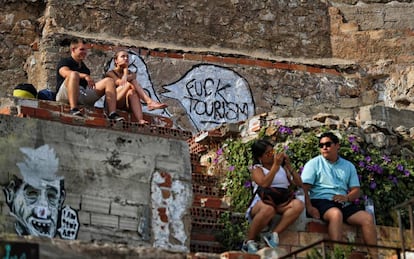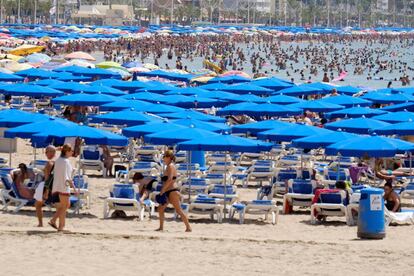How can Spain ensure the survival of its world-beating tourism industry?
Technology and changing attitudes undermine the sustainability of this vital sector

The recent attack on a Barcelona city tour bus by a radical separatist group has created a rift between the ruling Junts pel Si pro-independence coalition and its far-left partners in government, the CUP. Senior officials in the Catalan regional government have condemned the attack of last week, which highlighted opposition to mass tourism in Barcelona in some quarters. But an assemblywoman from CUP, Mireia Boya, has called the attack “symbolic” and instead accused the regional government of generating violence with its “neoliberal policies.”

The war of words illustrates how Spain’s most successful industry is being increasingly questioned by sectors of society who see little benefit from mass tourism. From Barcelona to Madrid, and even in out-of the-way places like Logroño, in the small wine-making region of La Rioja, opponents of mass tourism are becoming increasingly vocal in their protests.
Spain opened its doors to foreign visitors in the late 1950s, when the country was still under the rule of military dictator General Francisco Franco. Since then, the industry has been perfecting a system that has proven so successful that other countries now seek to emulate it. But social and technological changes have created new challenges that need to be addressed.
In 2015, tourism contributed over €110 billion to the Spanish economy, representing more than 11% of GDP. The auto industry was second at 10%. At least 75 million foreigners visited Spain last year, spending €77.6 million in the country, approximately the equivalent of a fourth of all manufacturing exports.
The change in mentality is now feeding into politics, with moratoriums on new hotel construction, tourist taxes, and crackdowns on unlicensed vacation rentals
And the figures keep rising: in the first half of this year, the number of foreign arrivals to Spain grew by 6.2%, compared with the same period in 2016. This source of income compensated for the free fall in other sectors of the economy during Spain’s protracted crisis.
The world looks to Spain as a role model. In April, it once again topped the World Economic Forum’s Tourism Competitiveness Ranking. The success can be attributed to a unique combination of cultural and natural resources, combined with solid tourism infrastructure, air links and government support, said the report.
But to Juan Ignacio Pulido, who teaches applied economics at Jaén University, “the Spanish model is clearly inefficient. It requires an enormous volume of demand, which in itself has a set of costs that are externalized socially and environmentally. ”

Which is why both the public and the private sector are starting to worry about the unbridled success of the mass tourism model. “We have the challenge of opening a deep debate on the most desirable kind of tourism growth with a view to the future,” said Exceltur, the industry lobby, in a report released last month.
“The progress we made towards developing a new model was ruined with the crisis,” adds Pulido. “The problem is that we keep measuring success in terms of visitor numbers.”
Exceltur admits that 2016 was a bumper year in part because of outside circumstances such as the impact of terrorism on other Mediterranean destinations like Turkey, Tunisia and Egypt.
The problem is that we keep measuring success in terms of visitor numbers
Juan Ignacio Pulido, Jaén University
But tourists are not spread out evenly across Spain. Overall there were 1.6 foreign tourists for every Spaniard in 2016, but that rate goes up to 2.4 tourists for every resident of Catalonia, 4.1 for every inhabitant of Barcelona, 6.3 for every resident of the Canary Islands and 11.7 for every native of the Balearic Islands, which include the hugely popular Mallorca and Ibiza. In the latter region, the pressure from tourism is such that many local workers have trouble finding affordable housing.
Meanwhile, the hotel market is undergoing a revolution. Investment funds are buying up property and seeking to turn a quick profit by turning units into vacation rentals, while online services such as Airbnb now lists over three million properties across the planet.
There is a price to this success. The sun-and-sand formula puts tremendous pressure on the country’s already-depleted water sources (especially in the Canary Islands), and climate change is not helping. Green groups continue to warn about the effects of untrammeled development along the coast – which is where most tourists want to be. The model also encourages a labor market where jobs are low-wage and seasonal.
As a result of all this, there has been a groundswell of opposition to continued growth in the tourism sector, which is viewed as a problem by some people. A June survey by Barcelona City Hall found that 19% of respondents think that tourism is the Catalan capital’s biggest problem.
“Perhaps what set alarms ringing is the saturation in city destinations,” says Pulido of Jaén University. “At sun and sand destinations, it’s normal to see a lot of people: that’s what you expect when you go to Benidorm. But in Barcelona, Málaga, Granada...that’s a whole other story.”
The change in mentality is now feeding into politics, with initiatives such as moratoriums on new hotel construction, tourist taxes, and crackdowns on unlicensed vacation rentals.
But the CEOE, the Spanish employers’ association, issued a recent reminder that the economic recovery in Spain is still far from consolidated, and that Spaniards should not be too harsh in their reaction to a vital sector of their economy.
English version by Susana Urra.
Tu suscripción se está usando en otro dispositivo
¿Quieres añadir otro usuario a tu suscripción?
Si continúas leyendo en este dispositivo, no se podrá leer en el otro.
FlechaTu suscripción se está usando en otro dispositivo y solo puedes acceder a EL PAÍS desde un dispositivo a la vez.
Si quieres compartir tu cuenta, cambia tu suscripción a la modalidad Premium, así podrás añadir otro usuario. Cada uno accederá con su propia cuenta de email, lo que os permitirá personalizar vuestra experiencia en EL PAÍS.
¿Tienes una suscripción de empresa? Accede aquí para contratar más cuentas.
En el caso de no saber quién está usando tu cuenta, te recomendamos cambiar tu contraseña aquí.
Si decides continuar compartiendo tu cuenta, este mensaje se mostrará en tu dispositivo y en el de la otra persona que está usando tu cuenta de forma indefinida, afectando a tu experiencia de lectura. Puedes consultar aquí los términos y condiciones de la suscripción digital.








































